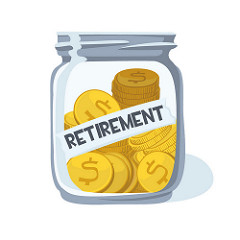10 Things You’ll Spend More Money On After You Retire

It would be best to determine how much you will spend in retirement before calculating how much you’ll need to save for a happy retirement. According to financial planners, retirees require 80% or more of their pre-retirement income to maintain their standard of living, though individual circumstances vary greatly.
Here are 10 budget categories where retirees are likely to spend more and some cost-cutting tips.
1. You will spend more on travel.
“Travel” is one of the top items on most retirees’ to-do lists.
Maybe you’re planning a couple of cruises. Or perhaps you want to pack your car for weekend trips with your grandchildren. In either case, you may spend more on travel in retirement than you anticipated.
2. You will spend more on healthcare.
According to the Employee Benefit Research Institute, the percentage of a household’s total spending on healthcare rises from 8% in pre-retirement households to up to 13% by the time they reach age 85.
Much of this increase in healthcare expenses for the average retired household is driven by unpredictable and costly new diagnoses and hospitalizations. Still, overall spending also rises for general health needs, prescription medication, insurance, medical services, and medical supplies. According to the National Council on Aging, 84% of people aged 65 and up have at least one chronic illness.
3. You will spend more on utilities.
According to the Urban Institute, the average retired household spends more on utilities each year than the average working household. Why? If retirees spend more time at home, they use more energy. Consider an increase in your bills—gas, electric, water and sewer, cable, and streaming services—as a forewarning.
4. You will spend more on moving and relocating.
In retirement, empty-nesters are more likely to fly. Downsizing that multi-bedroom home for smaller, more elderly-friendly living quarters is an obvious strategy that could save money in the long run. That is, for the most part, correct. However, the move-out process can cost thousands of dollars.
Not to mention all the other changes you’ll make to a new living space, such as new appliances, lighting, and window treatments.
5. You will spend more on fitness.
Around 53% of retired Americans engage in physical activity, spending about a third of their annual income on fitness and leisure activities. As a result, the fitness industry is beginning to cater to seniors, offering more specialized (and expensive) gym options for the elderly.
6. You will spend more on day-to-day expenses.
Many people’s lives aren’t drastically altered as they enter retirement. They can still drive to meet up with friends or colleagues, grab a coffee around the corner, or work from home on their laptops. However, what does change after leaving the workforce is who pays for the small things like lunches, parking, dinners, and concert tickets. In a nutshell, expenses!
7. You will spend more on debt.
Debt accumulation and subsequent interest are especially dangerous for retirees. Between 1989 and today, the average debt ballooned across all age groups, but older retirees were by far the hardest hit. According to a study by the National Council on Aging, the average debt held by individuals aged 65 and older continues to rise.
8. You will spend more on charitable giving.
Even with low income, Americans aged 65 and up donate nearly 11% more to religious, educational, charitable, and political organizations than those aged 55 to 64. On average, retirees aged 75 and up donate even more.
9. You will spend more time reading.
The average household spends $101 per year on reading before retirement. Yes, the Bureau of Labor Statistics tracks a category that includes the cost of books, audiobooks, and devices like the Kindle. The average household spends $173 per year in retirement, up by 73%.
10. You will spend more on financial planning.
However, keep in mind that the more money you have, the more effort it will take to manage it and make it work for you. Financial planners can help with this since their assistance is valuable, but it is not free. Depending on your preferred management style, deciding what to do with your money can become an expense in and of itself.
Contact Information:
Email: [email protected]
Phone: 9568933225
Bio:
Rick Viader is a Federal Retirement Consultant that uses proven strategies to help federal employees achieve their financial goals and make sure they receive all the benefits they worked so hard to achieve.
In helping federal employees, Rick has seen the need to offer retirement plan coaching where Human Resources departments either could not or were not able to assist. For almost 14 years, Rick has specialized in using federal government benefits and retirement systems to maximize retirement incomes.
His goals are to guide federal employees to achieve their financial goals while maximizing their retirement incomes.






